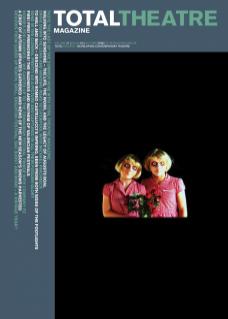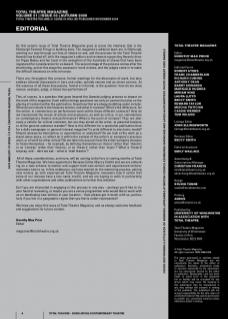As this autumn issue of Total Theatre Magazine goes to press the madness that is the Edinburgh Festival Fringe is building daily. The magazine’s editorial team are in Edinburgh, working our way through our lists of shows-to-see, and the process for the Total Theatre Awards has kicked off, with the magazine’s editors and reviewers supporting Awards director Pippa Bailey and her team in the evaluation of the hundreds of shows that have been registered for consideration for an Award. The second stage of the process comes after the shortlisting, and at this stage the assessors’ work is done, and the judges come in to make the difficult decisions on who to honour.
There are, throughout this process, formal meetings for the discussion of work, but also endless informal discussions in bars and cafes, outside venues and on street corners. At the essence of all these discussions, formal or informal, is the question: how do we view, review, evaluate, judge, criticise live performance?
This, of course, is a question that goes beyond the Awards judging process to impact on the work of the magazine. Each edition brings questions not only on content but also on the placing of content within the publication. Questions that are always bubbling under include: What do we include in the features section, and what in reviews? What’s the difference, for the writer, in commentary on performance work within these different contexts? How do we incorporate the voices of artists and producers, as well as critics, in our commentary on contemporary theatre and performance? What is the point of reviews? They are obviously a vehicle for critical comment, but are they aimed at the artist, at potential bookers, or at the general audience member? How is this different for a specialist publication than for a daily newspaper or general interest magazine? Is print different to electronic media? Should reviews be descriptive, or experiential, or analytical? Do we look at the work as a stand-alone piece, or reflect on it within the context of the artist’s or company’s previous work, or of work by other artists? Do we take into account how the artist/company chooses to frame themselves – for example, by defining themselves as ‘dance’ rather than ‘theatre’, or as ‘comedy’ rather than ‘theatre’, or as ‘theatre’ rather than ‘music’? What is ‘theatre’ anyway, and – dare we ask – what is ‘total theatre’?
All of these considerations, and more, will be coming to the fore in coming months at Total Theatre Magazine. We have appointed a Reviews Editor (Beccy Smith) and we are embarking on a new scheme to mentor and support both new writers and experienced writers/ reviewers new to us. In this endeavour, we have started on the mentoring process, pairing new writers up with experienced Total Theatre Magazine reviewers (you’ll notice that some of our reviews have a two-name credit), and we are hoping to work in partnership with other organisations and other publications to further this initiative.
So if you are interested in engaging in this process in any way – perhaps you’d like to try your hand at reviewing, or maybe you are a venue programmer who would like to work with us on developing new writers in your location – then please get in touch with us, particularly if you live in a geographic region that you feel is under-represented!
We hope you enjoy this issue of Total Theatre Magazine, and as always welcome feedback and suggestions for future content.

